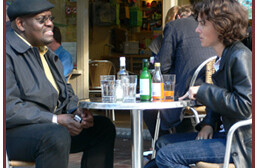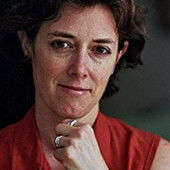Matthew Hennessey interviews Michela Wrong about her latest book. Their discussion includes the question of aid, corruption, the role of the tribe, and why Obama is not visiting Kenya on his first presidential visit to Africa.
It's Our Turn to Eat: The Story of a Kenyan Whistleblower
MATTHEW HENNESSEY: You're pretty hard on Western governments and aid agencies, even people like Jeffrey Sachs whom you accuse of "wishful thinking" with regard to the current crop of African leaders and their commitment to governance. What is wrong with the Western approach to African development?
MICHELA WRONG: A Kenyan journalist once said to me, "Western governments need to lend to us more than we need to be lent to." There is such a Western liberal guilt complex toward Africa. Our default position is to feel sorry for Africans, then to feel guilty, and then to throw money at the problem. I don't think we should cut all aid. There are levels of aid that will always have to be there because they save lives and prevent people starving and dying of malaria. But I can't agree with the Jeffrey Sachs position, which is that what we need to fix things is essentially more aid, and more and more and more. This strikes me as a form of neo-colonial thinking which puts all the emphasis on Western intervention in order to save Africa from itself.
It's been said many times: countries are not built on aid. There are no examples. In our desire to keep lending to Africa I think we can do a great deal of harm. And I think we often do. In our desire to keep lending, it becomes irrelevant what effect that aid is having on Africa. It becomes irrelevant that it may be encouraging people like Mwai Kibaki to think he can rig Kenya's elections and we won't mind. Or that he can stage a massive $750 million scam to divert state funds into his reelection campaign and it won't really matter because the West will end up picking up the tab for the health system, and the education system, and the road building. Aid can be damaging. But I'm not going to say that it's always damaging, and I certainly don't think it should be entirely switched off, but we do need to wise up.
MATTHEW HENNESSEY: What does the phrase, "You don't fight corruption by fighting corruption" mean?
MICHELA WRONG: That's a phrase I heard from Daniel Kaufmann, who is a former World Bank expert on corruption, and what he meant is that when Western donors to go into Africa looking to fight corruption, the first thing they find is that the police are incompetent and the judiciary is corrupt. So what they do is set up an anti-corruption commission or a special investigation unit within the presidency or a special police unit to tackle high-level corruption. And then at the top of these units you'd have these very high profile individuals, people like John Githongo. It's kind of a silver bullet approach and Western donors are often willing to pay for these units and expect them to solve everything.
This is what we've seen in country after country after country. The story I tell in this book is not only Kenya's story. It has happened in Nigeria and South Africa. What you see is that the anti-corruption authority is subverted very quickly. They are either neutered, or they end up being staffed by people who are so clearly part of the corrupt establishment that it is laughable. The point that Kaufmann is making is that there are tools that already exist in most African states—the police force, the civil service, the judiciary. You don't need new regulations or new codes of practices or new legislation passed. Although the West does like to make a big fuss about those types of things, what you really need are for those institutions which have been systemically eviscerated and hollowed out by the president of the day, you need those to be given back their impetus, their mojo. That's a really hard job. That's really difficult to do. But that's where you should spend your money if you're a Western donor. You need to have a decent judiciary that is independent of the political process. You need to have policemen who have cars so that they can actually get to the scene of a crime instead of sitting in the office. It's ridiculous, but in Kenya, if you're robbed you actually have to go and get the police to come to your house because they don't have fuel and they don't have cars. These organs already exist. Don't try and reinvent the wheel. Try to get the old wheel to work again. MATTHEW HENNESSEY: There was some pretty serious violence during the last presidential election in Kenya which, I think it's fair to say, caught a lot of people off guard. What were we missing about Kenya?
MICHELA WRONG: Kenya's always had a kind of golden aura around it—an image of safaris and people with pith helmets. But Kenya has got vast disparities in wealth. The most squalid slums in Africa are in Nairobi. Journalists who were covering the story saw this but thought that the place would somehow muddle along, because that was what always happened in the past. What happened last year was suddenly the nation stopped muddling along and all those things coalesced into this really nasty explosion of violence. The worrying thing is that everyone I speak to in Kenya is predicting a resumption of exactly that kind of violence before the next election. Only this time it will be worse because everyone has armed in preparation, and the weapons being handed out to ethnic militias are not just machetes or bows and arrows, but guns.
MATTHEW HENNESSEY: Where does that leave John Githongo, the corruption fighter who is the subject of your book? Didn't he recently return to Kenya?
MICHELA WRONG: Well, he's returned because he felt his country was facing a crisis and he had to be there. I think he's taking a risk, but he didn't want to be away any longer and I can understand that. If I were a Kenyan, I would want to be there too, because these are difficult times and if you stand back, you're sort of opting out. People with brains, and training, and experience need to go back and try and do what they can.
MATTHEW HENNESSEY: How has writing this book affected your own ability to live and work in Kenya?
MICHELA WRONG: I don't know, to be honest. I know I have trodden on a lot of toes and I will have become very unpopular in certain quarters. There's been a very strong reaction to the book. Much stronger than I would have expected, in fact, because a lot of the details of the scandal where already well known in Kenya. I thought, "Well it's all old hat and nobody's going to get worked up about it." But there's been a huge amount of discussion about the book. People can't buy it locally. Booksellers refuse to sell it. So it's been pirated in electronic form. People are smuggling it in from neighboring states. There's been a huge fuss about it. To a certain extent I'm happy just to let it happen and die away. Maybe then I'll go back and resume just being a normal reporter. I don't want to go back and be staging press conferences and giving speeches. John is there, this is his story. That's up to him.
MATTHEW HENNESSEY: Can you explain the role of the "tribe" in modern African life?
MICHELA WRONG: In the West it's become a politically incorrect word to use but most of African society and politics would be incomprehensible if you eliminated the tribe, or the ethnic concept from the equation. I think often you get some slanted and strange reporting on Africa because Western journalists fall over themselves trying to avoid using that word. In Kenya, as in so many African states, your entire life's chances are based on which ethnic group you belong to. And there is this mentality spread across Kenyan society that once your tribe gets into power then state assets are yours to do with as you wish. And since the previous tenant had exactly the same approach, then of course you are completely justified to be very greedy to compensate for how your group was treated in the past. So, "It's Our Turn to Eat" really means, "It's our community's turn at the trough."
MATTHEW HENNESSEY: Everyone knows that Barack Obama's father was Kenyan. Why isn't he visiting the country on his first presidential visit to Africa in July?
MICHELA WRONG: Africans regard Obama as one of their own who miraculously ended up in the White House. As far as they're concerned, he's not only U.S. president, he's also king of the world. There is enormous good will toward Obama, and it gives him leeway and influence that I don't believe any other American president has had in Africa. Although so far, he's been quite careful how he uses it. If I were in his shoes I would probably do the same thing and bypass Kenya. Kenya is in political crisis mode at the moment, with a coalition government that was set up after the elections thanks to international pressure and the influence of Kofi Annan, which is very close to falling apart. If Obama goes there, the danger is that it gets read as a gesture of approval and support. The visit would get put to all sorts of political uses—most of them unhealthy. Instead he's visiting Ghana, which recently had a very close election. But the ruling party there accepted its loss and stood down. So Obama is going there and implicitly expressing respect for the fact that the ruling party in Ghana did not go down the route that the Kenyans went down, tampering with the results when they saw they were losing. MATTHEW HENNESSEY: Thank you for speaking with me.





